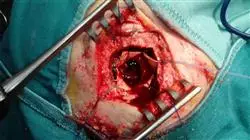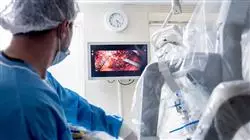University certificate
The world's largest faculty of medicine”
Introduction to the Program
Get up to date on the latest trends in the field of Neurosurgery alongside internationally renowned teaching experts and complete a comprehensive, intensive and immersive hands-on stay"

For several years now, medical science has been experimenting with the development of much more efficient surgical techniques for the removal of brain tumors. As a result of this line of research, much more comprehensive technologies and procedures have emerged that provide solutions to this and other neuropathies. However, it is not easy for specialists to keep constantly updated on the theoretical and practical aspects of these innovations. In order to offer a quality academic preparation, different from other programs in the market, TECH has developed a unique didactic modality that meets the indispensable requirements to update the neurosurgeon on the complexities of recent discoveries within his specialty.
Thus arises this Hybrid professional master’s degree in Neurosurgery which, unlike most of the other Certificates, is composed of two distinct educational stages. First, the physician will study different concepts and topics of interest, from a 100% online and interactive learning platform. Throughout 1,500 hours, you will be able to access all the contents freely, without worrying about continuous evaluations or pre-established schedules. You will also be able to use modern teaching methodologies, such as Relearning, to strengthen your mastery of all aspects of this Certificate.
The specialist must then complete a 3-week practical internship in a prestigious medical facility. The entities selected by TECH for this face-to-face, comprehensive and immersive phase have the most advanced technology in Neurosurgery and the resources for other related procedures. In this clinical practice, the neurosurgeon will exchange with experts of international prestige. In turn, it will be supervised by an assistant tutor, in charge of perfecting its praxis for the integration of new surgical trends. Upon completion of both phases of studies, graduates will achieve notoriety for their broad knowledge of the most recent considerations in this branch of medicine and a professional practice of excellence, focused on the quality of life of patients.
Thanks to this Certificate, you will gain the most rigorous practical skills in a specialized clinical practice in Neurosurgery lasting only 3 weeks"
This Hybrid professional master’s degree in Neurosurgery contains the most complete and up-to-date scientific program on the market. The most important features include:
- The graphic, schematic, and practical contents with which they are created, provide scientific and practical information on the disciplines that are essential for professional practice
- Assessment and monitoring of patients with different neural pathologies that require surgical intervention to improve their quality of life
- Comprehensive systematized action plans for the main pathologies of the brain
- Presentation of hands-on workshops on interventional diagnostic and therapeutic techniques
- An algorithm-based interactive learning system for decision-making in the clinical situations presented throughout the course
- All of this will be complemented by theoretical lessons, questions to the expert, debate forums on controversial topics, and individual reflection assignments
- Content that is accessible from any fixed or portable device with an Internet connection
- In addition, you will be able to carry out a clinical internship in one of the best hospitals in the world
With 10 theoretical modules, this Hybrid professional master’s degree has brought together the main novelties in relation to Neurosurgery and will also give you the opportunity to assimilate them easily from an online platform without restrictive study schedules"
In this Professional Master's Degree proposal, of a professionalizing nature and hybrid modality, the program is aimed at updating Neurosurgery professionals who wish to broaden their vision of the latest surgical procedures in the specialty. The contents are based on the latest scientific evidence, and oriented in a didactic way to integrate theoretical knowledge with practical elements and thus, allow decision making in patient management.
Thanks to its multimedia content developed with the latest educational technology, they will allow the Neurosurgery professional to obtain a situated and contextual learning, that is, a simulated environment that will provide an immersive learning programmed to train in real situations. The design of this program focuses on Problem
Based Learning, through which the student will have to try to solve the different professional practice situations that will arise throughout the program. For this purpose, the student will be assisted by an innovative interactive video system created by renowned experts.
Don't miss the opportunity to update your surgical knowledge in a fast, flexible, immersive way and from anywhere in the world thanks to TECH's interactive platform"

The practical part of this Certificate is 100% face-to-face and immersive, which will give you access to real cases that will help you perfect your new skills"
Why study at TECH?
TECH is the world’s largest online university. With an impressive catalog of more than 14,000 university programs available in 11 languages, it is positioned as a leader in employability, with a 99% job placement rate. In addition, it relies on an enormous faculty of more than 6,000 professors of the highest international renown.

Study at the world's largest online university and guarantee your professional success. The future starts at TECH”
The world’s best online university according to FORBES
The prestigious Forbes magazine, specialized in business and finance, has highlighted TECH as “the world's best online university” This is what they have recently stated in an article in their digital edition in which they echo the success story of this institution, “thanks to the academic offer it provides, the selection of its teaching staff, and an innovative learning method aimed at educating the professionals of the future”
A revolutionary study method, a cutting-edge faculty and a practical focus: the key to TECH's success.
The most complete study plans on the university scene
TECH offers the most complete study plans on the university scene, with syllabuses that cover fundamental concepts and, at the same time, the main scientific advances in their specific scientific areas. In addition, these programs are continuously being updated to guarantee students the academic vanguard and the most in-demand professional skills. In this way, the university's qualifications provide its graduates with a significant advantage to propel their careers to success.
TECH offers the most comprehensive and intensive study plans on the current university scene.
A world-class teaching staff
TECH's teaching staff is made up of more than 6,000 professors with the highest international recognition. Professors, researchers and top executives of multinational companies, including Isaiah Covington, performance coach of the Boston Celtics; Magda Romanska, principal investigator at Harvard MetaLAB; Ignacio Wistumba, chairman of the department of translational molecular pathology at MD Anderson Cancer Center; and D.W. Pine, creative director of TIME magazine, among others.
Internationally renowned experts, specialized in different branches of Health, Technology, Communication and Business, form part of the TECH faculty.
A unique learning method
TECH is the first university to use Relearning in all its programs. It is the best online learning methodology, accredited with international teaching quality certifications, provided by prestigious educational agencies. In addition, this disruptive educational model is complemented with the “Case Method”, thereby setting up a unique online teaching strategy. Innovative teaching resources are also implemented, including detailed videos, infographics and interactive summaries.
TECH combines Relearning and the Case Method in all its university programs to guarantee excellent theoretical and practical learning, studying whenever and wherever you want.
The world's largest online university
TECH is the world’s largest online university. We are the largest educational institution, with the best and widest online educational catalog, one hundred percent online and covering the vast majority of areas of knowledge. We offer a large selection of our own degrees and accredited online undergraduate and postgraduate degrees. In total, more than 14,000 university degrees, in eleven different languages, make us the largest educational largest in the world.
TECH has the world's most extensive catalog of academic and official programs, available in more than 11 languages.
Google Premier Partner
The American technology giant has awarded TECH the Google Google Premier Partner badge. This award, which is only available to 3% of the world's companies, highlights the efficient, flexible and tailored experience that this university provides to students. The recognition as a Google Premier Partner not only accredits the maximum rigor, performance and investment in TECH's digital infrastructures, but also places this university as one of the world's leading technology companies.
Google has positioned TECH in the top 3% of the world's most important technology companies by awarding it its Google Premier Partner badge.
The official online university of the NBA
TECH is the official online university of the NBA. Thanks to our agreement with the biggest league in basketball, we offer our students exclusive university programs, as well as a wide variety of educational resources focused on the business of the league and other areas of the sports industry. Each program is made up of a uniquely designed syllabus and features exceptional guest hosts: professionals with a distinguished sports background who will offer their expertise on the most relevant topics.
TECH has been selected by the NBA, the world's top basketball league, as its official online university.
The top-rated university by its students
Students have positioned TECH as the world's top-rated university on the main review websites, with a highest rating of 4.9 out of 5, obtained from more than 1,000 reviews. These results consolidate TECH as the benchmark university institution at an international level, reflecting the excellence and positive impact of its educational model.” reflecting the excellence and positive impact of its educational model.”
TECH is the world’s top-rated university by its students.
Leaders in employability
TECH has managed to become the leading university in employability. 99% of its students obtain jobs in the academic field they have studied, within one year of completing any of the university's programs. A similar number achieve immediate career enhancement. All this thanks to a study methodology that bases its effectiveness on the acquisition of practical skills, which are absolutely necessary for professional development.
99% of TECH graduates find a job within a year of completing their studies.
Hybrid Professional Master's Degree in Neurosurgery
Step into the fascinating world of neurosurgery with TECH Global University's Hybrid Professional Master's Degree. Our blended classroom program gives you the opportunity to get a quality education, combining the convenience of 100% virtual theory with hands-on experience in a specialized clinic. At TECH Global University, we understand that neurosurgery is a highly specialized discipline that requires a comprehensive approach. That is why we have designed a program that will allow you to acquire the necessary theoretical foundations through our innovative online learning environment. You'll access up-to-date study materials, live lectures and interactive resources that will guide you on your path to neurosurgical mastery. But we know that practice is essential to becoming a competent neurosurgeon. That's why our program includes face-to-face internships at a renowned clinic, where you'll have the opportunity to work directly with patients and apply your theoretical knowledge in a real clinical setting. Under expert supervision, you'll acquire advanced surgical skills and develop a multidisciplinary approach to the treatment of neurological disorders.
Be a highly regarded professional, thanks to TECH's teaching
At TECH Global University, we have a teaching team of excellence, made up of professionals with extensive experience in the field of neurosurgery. They will provide you with personalized guidance and help you perfect your technical and clinical skills, thus ensuring your professional growth and success in this demanding specialty. Don't miss the opportunity to become an expert in neurosurgery and make a difference in patients' lives. Join TECH Global University's Hybrid Professional Master's Degree in Neurosurgery and prepare yourself for a bright future in the field of neuroscience - enroll now and take the first step towards your career in neurosurgery!







